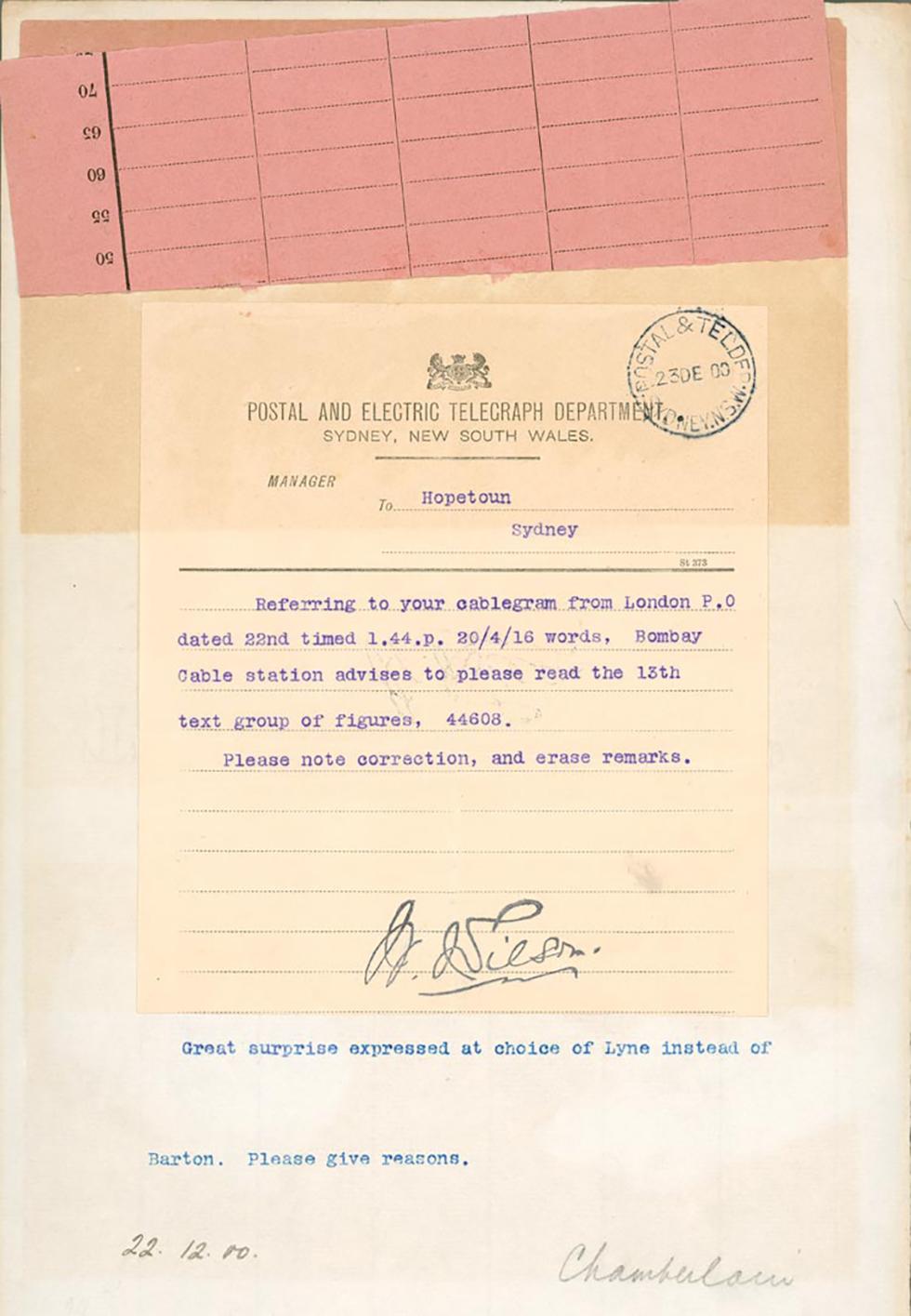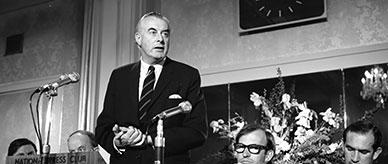


Transcript
Great surprise expressed at choice of Lyne instead of Barton. Please give reasons.
[Handwritten:] 22.12.00 Chamberlain
[A typed note on a separate piece of paper has been added:]
[Letterhead:] POSTAL AND ELECTRIC TELEGRAPH DEPARTMENT.
SYDNEY, NEW SOUTH WALES.
[Stamped in blue ink:] POSTAL & TELDEP [telegraph department] SYDNEY. N.S.W. 23 DE 00
TO Hopetoun
Sydney
Referring to your cablegram from London P.O dated 22nd timed 1.44.p. 20/4/16 words, Bombay Cable station advises to please read the 13th text group of figures, 44608.
Please note correction, and erase remarks.
[Handwritten signature:] M. Wilson
About this record
This is the telegram sent by the British Colonial Secretary in London, Joseph Chamberlain, to Australia's Governor-General Designate, Lord Hopetoun, asking for an explanation of Hopetoun's decision to invite Sir William Lyne, not Edmund Barton, to be Australia's first prime minister. Hopetoun received the telegram on 22 December 1900. On top of the telegram is a note from the manager of the Postal and Electric Telegraph Department in Sydney explaining an error that had occurred in transmitting the message at the Bombay cable station.
Educational value
- This telegram is a significant document in the controversy that immediately surrounded Lord Hopetoun (1860–1908) when he invited Sir William Lyne (1844–1913) to form the first federal government on 19 December 1900. Its wording of 'Great surprise' felt in London, combined with the request, 'Please give reasons', would have done much to convince Hopetoun that he had made a major error. His preference of Lyne over Barton is now known as the 'Hopetoun blunder'.
- Arguably Hopetoun may be excused for the 'blunder'. He had arrived in Sydney from England on 15 December after a terrible voyage in which he had contracted typhoid, and was advised soon after that Lyne – the powerful Premier of New South Wales, the senior colony – would be a suitable choice. Hopetoun had been a supporter of Australian federation when he was Governor of Victoria from 1889 to 1895, but by 1900 he was out of touch with Australian colonial politics.
- Edmund Barton (1849–1920) was in fact the logical choice to be invited to form the government. He had been a prominent politician in New South Wales and a tireless champion of federation, attending all the conventions and involved in drafting the Constitution. By 1897 he had become an acknowledged leader of the federation movement and in 1900 led the Australian colonies' delegation to London to limit change to the Constitution Bill by the British Parliament.
- Soon after the 'please explain' telegram arrived, its contents became largely irrelevant since Lyne was unable to form a government. As a political leader who had opposed both federation referendums in New South Wales in 1898 and 1899, he was unacceptable to leading federationists who followed Barton's lead in refusing to serve in Lyne's Ministry. On 24 December Hopetoun turned to Barton, who announced his Cabinet the following day and was sworn in on 1 January 1901.
- Joseph Chamberlain (1836–1914) played an influential role in Britain's acceptance of Australia's Constitution and in convincing Western Australia to join the federation. He was British Colonial Secretary from 1895 to 1903, and a powerful politician with immense responsibilities over the British Empire. As Governor-General of Australia, Hopetoun was the monarch's representative, but his office liaised with Chamberlain's office.
- It is hardly surprising that errors in transmission occurred between London and Sydney as the new telegraphic communication between the two cities followed an extremely circuitous route across Europe to Russia; on to Tehran; then onwards to the Indian telegraph between Karachi, Bombay and Calcutta; then from Bombay to Madras; then via submarine cable to Java and Darwin to join the Overland Telegraph to Adelaide; then to Melbourne and on to Sydney.
Acknowledgments
Learning resource text © Education Services Australia Limited and the National Archives of Australia 2010.
Need help with your research?
Learn how to interpret primary sources, use our collection and more.

